

Neglected India: Why Is Washington Ignoring the World’s Largest Democracy? On a balmy day in February last year, I sat down for lunch with one of India’s most prominent political columnists at the India International Centre in New Delhi, a place where left-wing academics, journalists, and Congress Party supporters like to congregate.
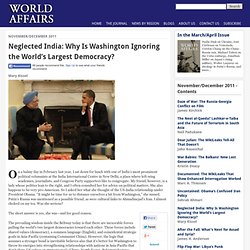
My friend, however, is a lady whose politics lean to the right, and I often consulted her for advice on political matters. She also happens to be very pro-American. So I asked her what she thought of the US-India relationship under President Obama. “It might be time for us to distance ourselves a bit from Washington,” she mused. Putin’s Russia was mentioned as a possible friend, as were cultural links to Ahmadinejad’s Iran. The short answer is yes, she was—and for good reason. The prevailing wisdom inside the Beltway today is that there are inexorable forces pulling the world’s two largest democracies toward each other.
Related Essay. The Rise of India's Soft Power - By Rani D. Mullen and Sumit Ganguly. India's soft power has now been on display for at least a couple of decades: Indian philosophy has captivated Western minds since the 1960s; Bollywood's prodigious celluloid fare has long drawn huge audiences in significant parts of Asia, Africa, and beyond; India's English-language novelists have often edged out native British writers for the prestigious Man Booker Prize; and, of course, yoga studios have become all but ubiquitous in the United States. However, even South Asian scholars and analysts have rarely thought of India's largesse as a possible source of material power, especially in the realm of foreign assistance. With U.S. Will India Ever Really Be America's Partner? - By Christopher Clary.
Secretary of Defense Panetta told an Indian audience last week that "defense cooperation with India is a linchpin" of U.S. efforts to "rebalance" its defense presence in the Asia-Pacific.

At a time when most American allies are plagued by shrinking economies, aging workforces, and contracting militaries, India stands out as a potential "net security provider" in Asia. Even though the Indian economy has hit a rough patch in the last few months, overall it is expanding -- along with the country's population and military. The problem is that India does not necessarily share the U.S. vision of an ever-closer strategic relationship. Fire in the Sky - By Jason Miklian and Scott Roecker. The instant his 50-foot-tall, tungsten-tipped "dream" rocket pierced the stratosphere on Thursday, April 19, V.K.

Saraswat could finally dare to exhale. Unlike with North Korea's disastrous display just days before, years of secret preparations by the director of India's Defense Research and Development Organization on its first intercontinental ballistic missile (ICBM) paid off flawlessly. Prime Minister Manmohan Singh was among the first to offer congratulations, telling him that "you made the nation proud. " The last time an Indian nuclear scientist was so honored, the country held parades and revelers even worshipped the bombs. The Buddha was smiling then; now, he's flexing. "An India-Pakistan Thaw?" by Shashi Tharoor. Exit from comment view mode.
Click to hide this space NEW DELHI – India and Pakistan are enjoying one of the better periods in their turbulent relationship. Recent months have witnessed no terrorist incidents, no escalating rhetoric, and no diplomatic flashpoints. Cold War - By Myra MacDonald. "They look like animals when they come down, unshaven, dirty, and thin as rods," said an Indian officer in September 2003, describing troops returning from a three-month stint on Siachen, where India and Pakistan had fought a war over an uninhabitable wasteland of snow and ice on their border since 1984.

In November 2003, the two sides agreed on a cease-fire; since then neither has fired a shot. Yet thousands of men remain, still dying from the brutal conditions -- in April, an avalanche buried 140 Pakistani troops and their civilian staff alive. Why India is Riskier than China - Stephen S. Roach. Exit from comment view mode. Click to hide this space NEW HAVEN – Today, fears are growing that China and India are about to be the next victims of the ongoing global economic carnage. This would have enormous consequences.
Putting Growth In Its Place. Is India doing marvellously well, or is it failing terribly?
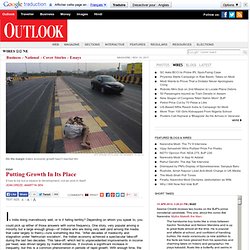
Depending on whom you speak to, you could pick up either of those answers with some frequency. One story, very popular among a minority but a large enough group—of Indians who are doing very well (and among the media that cater largely to them)—runs something like this. “After decades of mediocrity and stagnation under ‘Nehruvian socialism’, the Indian economy achieved a spectacular take-off during the last two decades. Poor Little Rich Country - By Patrick French. In May, the Indian government announced that it was giving $5 billion in aid to African countries in the interest of helping them meet their development goals.

"We do not have all the answers," Prime Minister Manmohan Singh said, "but we have some experience in nation-building, which we are happy to share. " India’s Year of Living Stagnantly - Jaswant Singh. Exit from comment view mode.
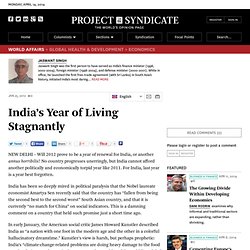
Click to hide this space NEW DELHI – Will 2012 prove to be a year of renewal for India, or another annus horribilis? No country progresses unerringly, but India cannot afford another politically and economically torpid year like 2011. For India, last year is a year best forgotten. India has been so deeply mired in political paralysis that the Nobel laureate economist Amartya Sen recently said that the country has “fallen from being the second best to the second worst” South Asian country, and that it is currently “no match for China” on social indicators. In early January, the American social critic James Howard Kunstler described India as “a nation with one foot in the modern age and the other in a colorful hallucinatory dreamtime.”
India's Broken Promise. India's political and business elites have long harbored a desire for their country to become a great power.
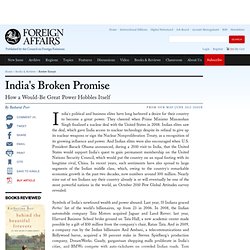
They cheered when Prime Minister Manmohan Singh finalized a nuclear deal with the United States in 2008. Indian elites saw the deal, which gave India access to nuclear technology despite its refusal to give up its nuclear weapons or sign the Nuclear Nonproliferation Treaty, as a recognition of its growing influence and power. And Indian elites were also encouraged when U.S. President Barack Obama announced, during a 2010 visit to India, that the United States would support India's quest to gain permanent membership on the United Nations Security Council, which would put the country on an equal footing with its longtime rival, China. In recent years, such sentiments have also spread to large segments of the Indian middle class, which, owing to the country's remarkable economic growth in the past two decades, now numbers around 300 million.
To continue reading, please log in. Chicago Booth Blog: Fault Lines by Raghuram Rajan - Fault Lines by Raghuram Rajan. Speech at a function to re-release a book of essays in honor of Dr.
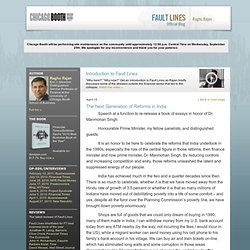
Manmohan Singh. Honourable Prime Minister, my fellow panelists, and distinguished guests: It is an honor to be here to celebrate the reforms that India undertook in the 1990s, especially the role of the central figure in those reforms, then finance minister and now prime minister, Dr. Manmohan Singh. By reducing controls and increasing competition and entry, those reforms unleashed the latent and suppressed energy of our people.
Asia’s Natural-Born Allies - Brahma Chellaney. Exit from comment view mode.
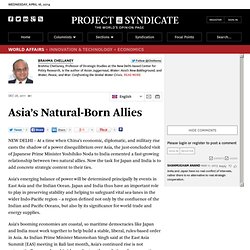
Click to hide this space NEW DELHI – At a time when China’s economic, diplomatic, and military rise casts the shadow of a power disequilibrium over Asia, the just-concluded visit of Japanese Prime Minister Yoshihiko Noda to India cemented a fast-growing relationship between two natural allies. Now the task for Japan and India is to add concrete strategic content to their ties. Asia’s emerging balance of power will be determined principally by events in East Asia and the Indian Ocean. Japan and India thus have an important role to play in preserving stability and helping to safeguard vital sea-lanes in the wider Indo-Pacific region – a region defined not only by the confluence of the Indian and Pacific Oceans, but also by its significance for world trade and energy supplies.
Asia’s booming economies are coastal, so maritime democracies like Japan and India must work together to help build a stable, liberal, rules-based order in Asia. "India’s American Friends and Iranian Partners" by Brahma Chellaney. Exit from comment view mode. Click to hide this space NEW DELHI – The United States recently took the Iran-sanctions monkey off India’s back: it granted India an exemption from Iran-related financial sanctions in exchange for significant cuts in Indian purchases of Iranian oil. Nevertheless, Iran continues to cast a pall over an otherwise brightening US-India relationship. From India’s perspective, Iran is an important neighbor with which it can ill afford to rupture its relationship.
Indeed, India already seems locked geographically in an arc of failing or dysfunctional states, confronting it with external threats from virtually all directions. If India joined the US containment strategy against Iran, it would have to bear serious strategic costs. Few countries are as dependent on the Persian Gulf region’s hydrocarbons as is India, which imports almost 80% of its consumption. The War for India's Internet - By Rebecca MacKinnon. "65 years since your independence," a new battle for freedom is under way in India -- according to a YouTube video uploaded by an Indian member of Anonymous, the global "hacktivist" movement. With popular websites like Vimeo.com blocked across India by court order, the video calls for action: "Fight for your rights. Fight for India. " Over the past several weeks, the group has launched distributed denial-of-service attacks against websites belonging to Internet service providers, government departments, India's Supreme Court, and two political parties.
Street protests are being planned for this coming Saturday, June 9, in as many as 18 cities to protest laws and other government actions that a growing number of Indian Internet users believe have violated their right to free expression and privacy online. A lively national Internet freedom movement has grown rapidly across India since the beginning of this year. India is not China or Iran, however. News Desk: Rushdie Non Grata. The Jaipur Literary Festival, a giddily chaotic celebration of the written word set on the grounds of a Rajasthan palace, ended in misery and embarrassment today, with the organizers bowing to pressure from local security forces and scotching plans for Salman Rushdie to “appear” at the festival, finally, by video link.
Inscrutable India: Jaipur Literature Festival’s Baffling Bazaar of Culture and Commotion. The line to see Oprah stretched far down the highway. At the entrance to Diggi Palace, the front of the queue fanned into a thick crowd spread across several police barricades. India's Polio Win. Antibiotic-resistant NDM-1 Is Undermining India's Medical Sector. India's Corruption Problem. On Change in India. The Cult of Mayawati. Millions of Indian voters will head to the polls this week in Uttar Pradesh, the country's largest and most populous state.
Indians Against Democracy by Pankaj Mishra. This is the first in a new NYRblog series about the fate of democracy in different parts of the world. India’s Anti-Corruption Contest - Shashi Tharoor. Exit from comment view mode. Click to hide this space NEW DELHI – India ended 2011 amid political chaos, as the much-awaited “Lokpal Bill,” aimed at creating a strong, independent anti-corruption agency, collapsed amid a welter of recrimination in the parliament’s upper house, after having passed the lower house two days earlier. The episode, which leaves the bill in suspended animation until its possible revival at the next session, raises fundamental issues for Indian politics which will need to be addressed in the New Year. The need for the bill – Lokpal loosely translates as “ombudsman” – was first mooted in 1968, but eight subsequent attempts to create one had never reached a parliamentary vote. The Battle for Bihar - by Sudip Mazumdar.
Democratic to a fault? "India’s Democratic Tempest" by Shashi Tharoor. The Grooming of Rahul Gandhi. The Price of Oranges. Falling Man. The forgotten hunger strike. "Connecting to the Future" by Shashi Tharoor. Gandhi and South Africa. The city vanishes. India Shaken by Plight of 13-Year-Old Maid. The Indian Mutiny That Wasn't - By Shashank Joshi. Indian sisters are doing it for themselves. For Nepali Girls Abducted into Indian Brothels, Where is Home? - Habiba Nosheen & Anup Kaphle - International. Indian girls become child brides instead of prostitutes.